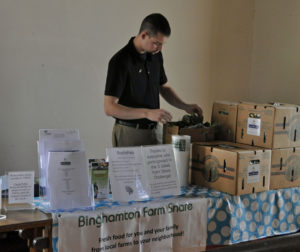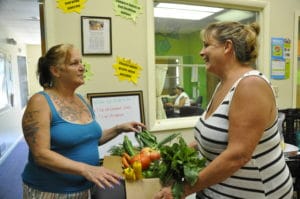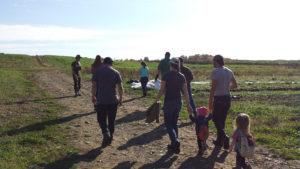Successful CSAs in Low-Income Communities
Binghamton Farm Share helps CSA farmers develop sustainable business in untapped low-income markets.
by Kate Miller-Corcoran
Connecting farmers and residents in low-income areas is a strength of the Binghamton Farm Share. Each season since its inception in 2013, half of the share members have fallen within very low to moderate income ranges, as set forth by the U.S. Department of Housing and Urban Development. Share distribution grows each year, and in 2016 an average of 65 weekly shares, bringing in around $1,300 weekly, were distributed to members falling within these income levels. While there is initial work that needs to be put into growing relationships in these areas, the benefits reaped by both the share members and the farmers is incredibly worthwhile. Programs like Binghamton Farm Share help to lighten the load on the farmers by having a central contact for the members, allowing the farmers more time to grow their produce. However, farmers around the country are also successfully marketing shares and delivering to low-income areas on their own.
Binghamton Farm Share (BFS) is a modified Community Supported Agriculture (CSA) program, born from a study done in 2012 by the Center for Agricultural Development and Entrepreneurship (CADE) in Oneonta, NY, to determine the best way to increase access to good food in local food deserts. This study found that convenience and price were the top priorities for residents when it came to buying food, which BFS is able to achieve. Every week of the growing season, Binghamton Farm Share goes directly into neighborhoods that lack fresh, healthy produce to distribute CSA shares from local farms. By accepting SNAP benefits and providing a 50% discount to income eligible members, residents can better afford this good food. This opens an untapped market for farmers, one that should be further explored as we move into the future.
The success of Binghamton Farm Share relies heavily on the member education that we provide for our members. With the help of a grant from the Northeastern Sustainable Agriculture Research and Education (NESARE) program, we have been able to create extensive member education materials. These materials are universal, and can be found on our website for use by any farm that may wish to use them.
Keeping in mind that many of our share members are new to cooking with fresh vegetables, we create easy-to-follow recipes using ingredients that most members have on hand. This makes recipes accessible both to members who might be facing economic hardships, but also to members who are new to using a CSA as their source of produce for the week. Showing members how the produce they receive can enhance food they are already eating as well as sharing variations of dishes that members are familiar with to help people think about produce in new ways. For example, we have recipes for carrot tacos, zucchini “crab” cakes and broccoli quinoa tots. We have these recipes available to sample at distribution. When members have tried something and know they like it, they are more likely to take the time to replicate it at home.

Members receive education materials both electronically and at the distribution site; Photographer Maria Majka.
People joining a CSA generally have the desire to learn to cook with fresh produce, but some lack expertise. Guiding members in the basic ways of using fresh produce helps to retain members. To start, we created a comprehensive vegetable list, which includes all produce that has been distributed through BFS. Using this, members can identify produce, get simple preparation techniques, and learn how to store the produce for both the short and long term. The comprehensive vegetable list was also split into individual Quick Guides for less common produce to distribute on weeks they are found in shares. Both the comprehensive vegetable list and the quick guides can be found on the Binghamton Farm Share website.
When members understand the importance of proper storage, for both the short and long term, retention increases throughout the season. We found BFS members were commenting on their end of season surveys that their produce wasn’t staying fresh long enough. Lack of knowledge in storage was attributed to much of this. For the past two growing seasons we have provided a colorful single sided “Care for Your Share” informational sheet that our members receive at the start of the season to hang on their refrigerator. It’s a quick reference on how to store produce and how quickly each vegetable should be consumed. We also place an emphasis on storage at weekly distribution. We provide our distribution volunteers with extra knowledge and prompts for helping members understand what is in their share and how to store it.
Through our NESARE grant, we have been able to work with our partner farms to help them understand the needs of members who may have limited resources or lack experience preparing food. Many of these members simply want access to affordable produce, and are not looking for more sophisticated shares. While we acknowledge that the traditional CSA model is not one in which a member chooses the food received, we also must understand the needs of our members if we are to have success in spreading fresh produce into areas that need it most. People just learning to eat healthy are most likely to stick with a CSA share if it contains a majority of produce that they can recognize.
It’s important to consider what members in lower income brackets may be facing. What cooking utensils are available? Do they have cutting boards, ingredients to prepare food, or time to prepare extensive recipes? BFS raises money throughout the year to purchase cooking utensils and spices to give our members to start the season with. We also utilize surveys; most helpful is the mid-season survey which encourages members to give us feedback on what produce they need more help with, what recipes they would like to see more of, etc.
Our farmers adapt to create shares that with the 50% discount will cost members less than $10. It is important to remember that even when people are paying that little per week, it is an investment of their food budget. According to the Food and Health Network’s 2014 “Helping to Create Hunger-Free Communities” Report, “In 2013, monthly SNAP benefits in the [9 county] region averaged about $132 per recipient.” If a share member receives the least expensive share their cost is $40 per month or 30% of their food budget.
Another consideration is the unpredictability that can come with living without economic security. Member reminders are extremely important. Both a reminder the day before and having someone that can call members within a half hour of the end of distribution if a share has not been claimed are provided. BFS also utilizes a Share Bank, which is available for member use if a payment cannot be made. Certain times of the month budgets can be tight and this helps to keep members in the program rather than leaving due to embarrassment of not having funds to pay for a share. Members are able to use the Share Bank twice in a season without paying it back. However, most members do reimburse the money used.
There are programs that farmers can tap into to make CSA programs accessible to members in low-income areas, including asking your own members to donate to a fund for those who may not be able to afford the full price of the CSA. This way, farmers can still be paid the full price for their share and families who most need it can have healthy, nutritious food on their tables.
Food is a commonality among us all. Food brings people together and creates community. Our world is seeking community now and small farms are situated to bring people together through programs like Binghamton Farm Share.
Kate Miller-Corcoran grew up on a dairy farm in Windsor, NY, where her family has been farming for 4 generations. She received her BA in English from Penn State University and her Master of Arts in English from SUNY Cortland. Currently, Kate is the Program Coordinator for Binghamton Farm Share. She can be reached at farmshare@vinesgardens.org or (607) 238-3522.
For more information, visit:
Binghamton Farm Share: vinesgardens.org/farmshare
Food and Health Network Resources: https://foodandhealthnetwork.org/food-resources/
Northeast SARE: http://www.nesare.org/



